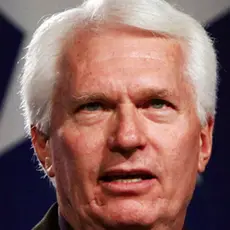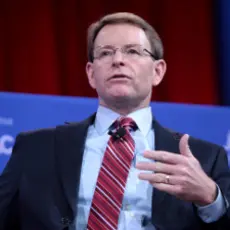Hillary Clinton has faced her share of sexist attacks in her presidential campaign, and plenty of Clinton supporters have been accused of voting for her “just because she’s a woman,” but attacking Clinton explicitly for being a woman has generally been considered to be beyond the pale. Except, that is, among a small segment of Religious Right activists who believe that God proscribes women from taking political leadership roles and are willing to talk about it.
Back in 2008, when John McCain picked Sarah Palin to be his vice presidential running mate, some Religious Right leaders had muddled reactions to a female nominee who also happened to share many of their policy priorities.
The Family Research Council’s Tony Perkins explained that there was no contradiction in supporting a woman as vice president even though he is a member of a denomination that bars women from serving as pastors because the Bible only prohibits a woman from being a “spiritual leader.” Richard Land, then the head of the Southern Baptist Convention’s political arm, said that it was perfectly fine for Palin to serve in the role as long as her husband was okay with it. Al Mohler said that while he was thrilled with Palin’s politics, if he were her pastor he “would be concerned about how she could balance these responsibilities and what this would mean for her family and her roles as wife and mother.”
Michele Bachmann met some similar reactions when she ran for president in 2012, complicated by the fact that Bachmann herself had declared adherence to submission theology, the belief, as Sarah Posner has explained, that the “husband is the spiritual head of the household, the wife his obedient ‘helpmeet,’ the vessel for their children, devoted mother, and warrior for the faith.” Bachmann deflected those criticisms using logic similar to Perkins’, saying that the presidency “is not a spiritual position, it is a position of authority in our government, it is very different from that of a wife to her husband.”
Not everyone was convinced. While Bryan Fischer, then an official with the American Family Association, wrote early on in Bachmann’s campaign that the congresswoman was “in fact submitting to her husband by running for president ” because her husband had urged her to run, he did not seem completely convinced of his own point. Fischer said on his radio program the very same week that a woman should be allowed to become president only as a last resort “if God can't find any men with the spine and with the testicular fortitude” to lead. In that case, he said, God would “send a woman to do a man’s job.” As the election approached, Fischer went back to stating his belief that political leadership should be “reserved for the hands of males.”
It’s not surprising, then, that the question of whether a woman should be president has bubbled up again this year among some of the same people. Fischer declared this week that he doesn’t “believe that women should be entrusted with high political office,” implying that it would be reasonable to “vote for Trump because he's a man.”
Sam Roher, a former Pennsylvania state legislator who heads the American Pastors Network, which works to organize politically engaged conservative pastors, cited the book of Isaiah this month to argue that having women in political leadership is a mark of judgment upon a nation. “God does raise up women,” he explained, “there is no question about it, but the real condemnation is not the women in office, the condemnation is the disregard and the absolute inability for male leadership to perform as God intended it and I believe that that's the application for us now.”
Gary Dull, a board member of the pastors’ network who also runs its Pennsylvania chapter, used the same passage from Isaiah to argue more firmly that women should not lead nations. “In God's line of authority,” he said last month, “it seems very clear in the scripture that a woman should not be in authority over men, which would limit a woman from being the president of the United States of America or even a queen of some other particular nation.”
Kevin Swanson, a fringe pastor who nonetheless hosted three GOP presidential candidates at a campaign event in Iowa last year, responded to Clinton’s candidacy this month by saying that electing a female president would be “the final chapter” in feminists’ war against America. The white nationalist radio host James Edwards — a big Donald Trump fan — has cited “God’s law” to question whether a woman should be president.
And this isn’t even to mention the fringe activists who have said that women shouldn’t even be allowed to vote, including Theodore Shoebat, who recently managed to feed a conspiracy theory about Khizr Khan to the Trump campaign. Jesse Lee Peterson, a frequent guest on conservative talk shows, has also argued that women should never have been given the right to vote.
Those who think a female candidate should be disqualified from the presidency are mercifully few. And submission theology, which deals with a woman’s role in the household and the world, varies greatly among those who preach it. But as the reactions to Clinton’s candidacy have shown, the question of whether a woman should be president hasn’t been entirely settled in the Christian Right. After all, as Phyllis Schlafly says, who needs a woman president when “all our greatest presidents have been men"?










